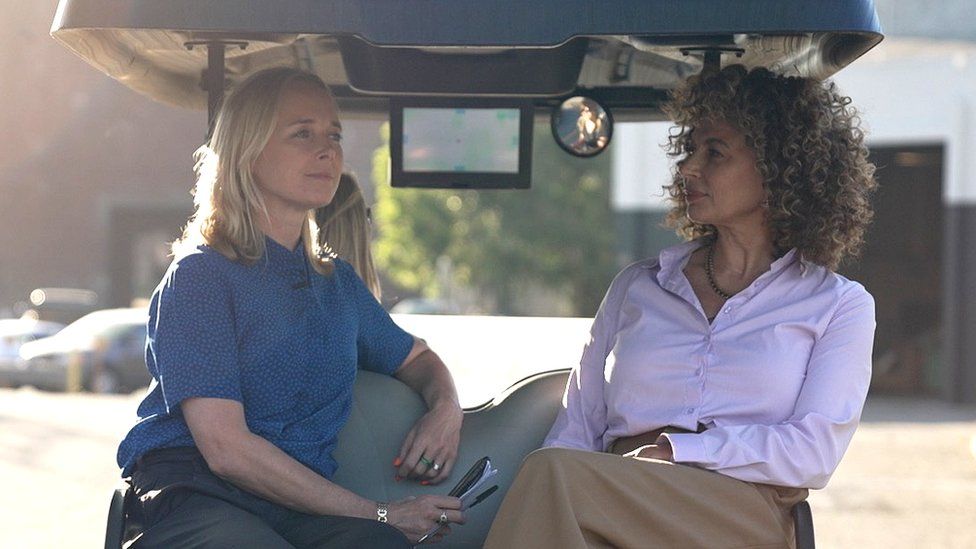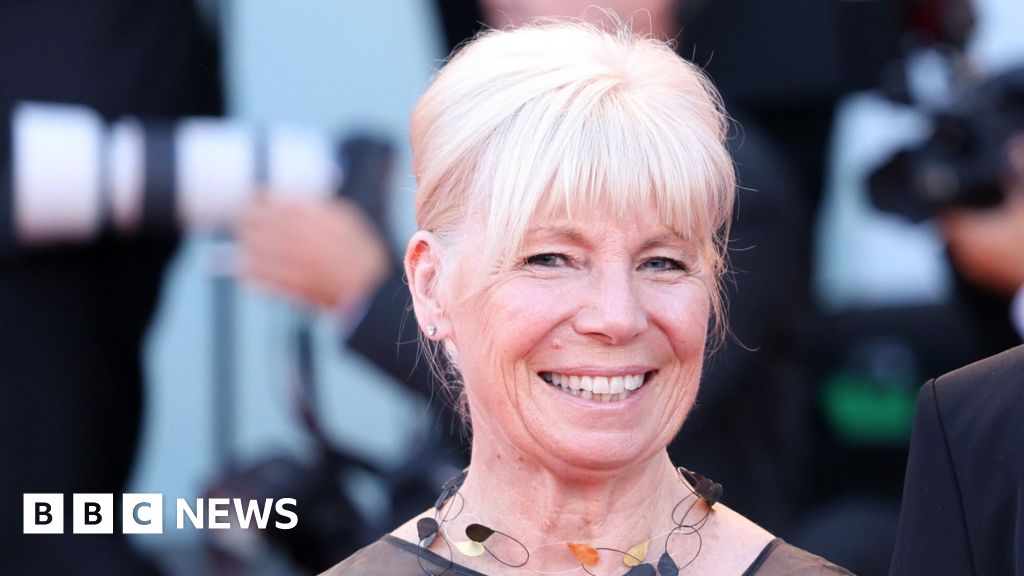ARTICLE AD BOX

Donna Langley spoke to the BBC's Katie Razzall at Universal in LA
By Katie Razzall
Culture editor
Donna Langley is a woman with big plans, not least to send Tom Cruise into space.
As the chairman of Universal Filmed Entertainment Group, she's the first British woman to run a major American film studio.
It makes her one of the most powerful people in Hollywood. Not bad for a Brit from the Isle of Wight who arrived in Los Angeles in her early 20s with no contacts in the movie business at all.
Thirty years on - and now a Dame - Langley tells me she still feels "culturally very English, even though my accent slips in and out a bit".
She does sound more transatlantic than Isle of Wight, but as we ride together on the back of a golf cart around the Universal lot, she assures me: "I still like my Marmite sandwiches and a good packet of crisps."
Langley has turned Universal's fortunes around, and has been steering the oldest surviving US film studio through the difficulties of a pandemic as well as the rise of the streaming platforms.
She is impressive and down to earth - but the project Universal is developing with Cruise is literally out of this world.
The BBC's Katie Razzall spoke to Donna Langley at Universal in LA
Langley tells BBC News that Cruise plans to take a rocket up to the International Space Station. The movie plot, which Cruise and director Doug Liman pitched to her on Zoom during the pandemic, "actually takes place on earth, and then the character needs to go up to space to save the day".
The hope, she adds, is that Cruise will be "the first civilian to do a spacewalk outside of the space station".
Image source, PA Media
Image caption,Donna Langley is reaching for the stars with the help of Tom Cruise
For Universal, the space film is clearly still an aspiration at this stage.
More definite is the slate of 44 movies announced for release in 2022/23 as the industry tries to get back to pre-Covid levels.
There will be the lucrative franchise stalwarts (among them another Trolls movie; the 10th Fast and Furious, shot in the UK; and then Despicable Me 4 in 2024). But there's creative range too.
Langley's wooed Steven Spielberg back to the studio where he made Jaws and ET. The Fabelmans has just premiered at the Toronto Film Festival. Christopher Nolan will release his next movie Oppenheimer with Universal after he dumped Warner Bros for Langley.
The forthcoming She Said stars Carey Mulligan as one of the journalists who broke the Harvey Weinstein scandal.
Image source, Universal
Image caption,The Despicable Me franchise has been extremely lucrative for Universal
Picking which movie pitches will fly is "gut instinct", she tells me in a lengthy interview for BBC Radio 4's The Media Show. Rather than rationalising decisions through a business model lens, it's about "feeling the story on a very human level", she says.
Her USP in part comes from learning early in her career to "make films that were aimed at a specific audience", often people traditionally ignored by Hollywood. She found that movies appealing to women or people of colour, for example, were "good business. The amount of money [the films] make is relative to what they cost, so they're hugely profitable."
She championed Straight Outta Compton, the movie charting the rise of hip-hop group NWA, which took $201m at the box office worldwide.
Famously, she fought for Mamma Mia when others weren't keen. The movie, based on Abba's back catalogue, was a smash hit, with global takings of $600m.
"They are films that I didn't see as inherently risky. It's easy for me to sit here with you today and say that, when the proof is in the pudding."
But for Langley, there's a common thread to that success, even if others didn't see it. They were universal stories audiences could relate to.
Image source, Universal
Image caption,Donna Langley with Ice Cube on the set of Straight Outta Compton
Phyllida Lloyd, Mamma Mia's director, praises Langley's "clarity and calm". She told me the Universal executive had "a business-like approach. She really did not sweat the small stuff."
Sharon Waxman, editor in chief of The Wrap, one of Hollywood's most influential publications, describes Langley as "hugely respected". Of course not everything is a hit and Waxman points to the disappointing opening weekend for Bros, Universal's gay romcom. They are the first major studio to make a movie of this kind.
But she credits her with taking risks. She Said, for example, "is not a movie that every studio would decide to green light".
Abba fan
Storytelling (and Abba), Langley says, were a big part of her childhood on the Isle of Wight. Her biological father was Egyptian and she was adopted as a baby. Her mum was an activist ("she had me shaking a can on behalf of Greenpeace or CND on the local high street"), while her dad worked for the Civil Aviation Authority.
Going to the cinema wasn't a common family event, although she remembers her sister taking her to see an Abba concert movie in the 1970s (which was "90 minutes of heaven, I was so happy"). Instead, the family read widely, and perhaps that drew her to film.
"As Brits, we grow up with a deep love of literature," she says. Free to roam on the Isle of Wight, "my imagination would run wild with the history of the place, whether it was smugglers or aristocracy".
On the island, her heritage meant she was viewed, she says archly, as "exotic", adding: "It gave me a sense of independence." She says she was "bullied a little bit" in school and found humour was a way to deflect the "tougher moments".
Image source, Universal
Image caption,Abba, which spawned Mamma Mia and Mamma Mia! Here We Go Again, was Langley's favourite group growing up
So how did that kid make it so big in Tinseltown? Langley told me she "didn't see a future" for herself in the UK of the early 90s though she "had no idea I was going to work in film". She admits "I do have moments when I look back and think how did it all happen?"
Langley was just 22 when she arrived in LA with a letter of introduction to a literary agent, planning to stay just a few months. But she was "bitten by the bug" and "it became obvious I needed to stay". She found the US "less restrictive," telling me that whereas Britain was very hierarchical, in America "if you have an idea, a work ethic, you can make it".
She got her first break while working in a nightclub on Hollywood's Sunset Boulevard. One of the regulars hired her at New Line Cinema.
She credits her success to "a bit of delusional self-belief" and a lot of hard work, though the Hollywood of the time wasn't "for the faint of heart, you had to have some chutzpah".
Image source, Universal
Image caption,Universal's Jurassic World Dominion was shot just outside London
Langley is committed to British film-making. Universal's Jurassic World Dominion, shot at Pinewood Studios, was the first Hollywood blockbuster to resume filming during the pandemic, and they'll soon start production on Wicked in the UK.
Ben Roberts, CEO of the BFI, told me she is "one of the most successful British executives in the business - and we're delighted that Universal have decided to base so many of their productions here in the UK".
With the future of cinema still in the balance, Langley accepts that streaming movies at home is here to stay. She earned the fury of cinema chains when she decided during the pandemic to put Universal's new Trolls movie straight on to a streaming platform. She says it was a "watershed moment". It certainly severed the tradition of big movies going first into cinemas.
Image source, Universal
Image caption,Vin Diesel is the star of the blockbuster franchise Fast and Furious
Waxman believes Langley's biggest challenges now are "to refill the pipeline of Universal with the kinds of blockbusters, like the Fast and Furious franchise, that will drive billion dollar global hits".
For Langley, the "$100bn question" is what will entice audiences back into cinemas. She accepts they're "the domain of the big visual effects movies… but what else?"
While "the bar is getting higher" on the kinds of movies people will leave their home to watch, she has a use-it-or-lose-it message.
"To make movies matter, to make them connect with the cultural zeitgeist, to create movie stars and to create directors and careers, it really does need that theatrical experience," she says.
Listen to the full interview with Donna Langley on The Media Show on BBC Sounds and watch on BBC iPlayer.

 2 years ago
23
2 years ago
23








 English (US) ·
English (US) ·